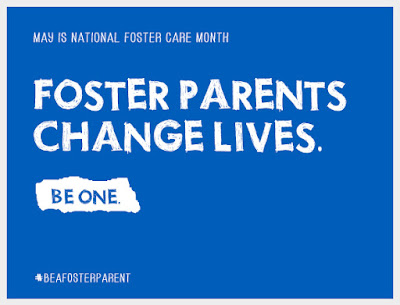May is National Foster Care Month
May is National Foster Care Month
By Sarah Reno Baker
“There
are no unwanted children, just unfound families.” ~ Sevenly.org
Every child deserves a
home. We hear of the wonderful success
stories of children in our community and all over the world. What about the children who no longer have a
home? Foster care is a crucial step to
get kids what they deserve when pulled from their parents, homes, and
crises. Foster care helps build a
foundation for our children when life is tough so that they can later be
successful in their adult lives.
Statistics
On
September 30th,
2014 , approximately 400,000 children were in foster
care. In the United States United
States
Care Skills needed for being a
Foster Parent
First,
know your family and your home life. Taking the role of a foster-care family is
a big deal, take your time before you make the decision. Each state has
different guidelines, so it is necessary to become familiar with your state
regulations, and who can and cannot be a foster parent. A person must have the
ability to have compassion, the ability to let go, and patience, among numerous
other skills. All members of the family should be included in the decision
making to become a foster-care family. Second, learning how to be an effective
communicator. Being a foster parent will
put you in touch with many different people.
Communication will happen with social workers, teachers, therapists, the
birth family, judges, other foster family, your friends and family, and the
child. Third, understand that at times, being a foster parent can and will be
challenging. Be prepared when your foster child arrives and establish your role
as a foster parent. Ask yourself which age, gender, and behavior would be most appropriate for you and your family. Understand the challenges involved with
becoming a foster parent by education on the topic. Fourth, managing behaviors of challenging
children. It is critical the prospective
foster parent understand what can and cannot happen pertaining to discipline to
a foster child. Corporal punishment is
not permitted in foster care. “Remember that your job as a foster parent is to
build an attachment with the foster child and physical discipline may destroy
the bond that you are trying to create.” Fifth, comprehension of the child’s
losses is essential, as well as the foster family. We can understand how to
meet the needs of the children if we understand the grieving process
ourselves. Considerations for children
include, but are not limited to losing their home, trauma, losing their family,
abuse, the children’s ages, and the support in which they are subjected to.
Finally, a skill needed for foster parenting is to know how to work with others
and be a team player. After all, it is
the child that matters and it takes a team of people to get the care needed. As
a foster parent you are an advocate for the child, be the best you can be.
If
you would like to be an advocate for a child in our community that needs your
help and learn more about becoming a foster parent, please contact Humboldt AVA today.
This column is not
intended to be a substitute for professional medical or psychological advice or
treatment.

Comments
Post a Comment